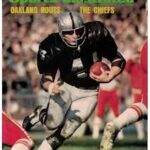A committee member recently asked me my opinion on inducting former Washington Redskins running back Larry Brown into the Pro Football Hall of Fame.
First, I want to say it’s an honor that this committee member values my opinion enough to ask me to contribute to this discussion.
I have the utmost respect for Larry Brown, his achievements, and his approach to playing the game. He played with a mindset of giving 100% effort on every play, a quality not often seen in today’s game. Despite his small size, he possessed the courage and fearlessness of a giant.
LISTEN ON YOUR APP OF CHOICE
Larry's Playing Style
Larry often said that his mental toughness came from growing up in the tough Hill District of Pittsburgh.
Unfortunately, this style of play, combined with his small size, resulted in knee injuries. Unlike today, a knee injury in the 1970s was difficult to recover from. Arthroscopic surgery was not available back then, and physical therapy and rehabilitation were not as advanced as today.
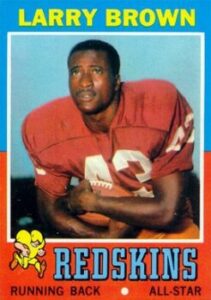
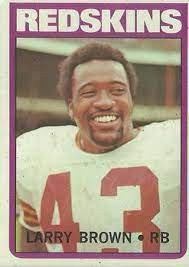
Because of these injuries, he was never the same player after the 1972 season.
Of course, that’s not Larry’s fault. If they had the technology and knowledge in the 1970s that they have today, his career probably wouldn’t have been cut short, and he’d likely already be in the Hall of Fame.
Brown’s accomplishments in his first four seasons are impressive, but is it enough to warrant a bust in Canton? I’m not sure it is. You can argue that other Hall of Fame players had their careers cut short by injury. Gale Sayers and Terrell Davis are two examples. Why are they in, and Brown isn’t? Maybe they were more popular, and we all know that popularity influences who gets inducted and who doesn’t.
Similar Running Backs
Another reason could be that running backs skilled at catching passes out of the backfield are undervalued. Players like Brown, Lydell Mitchell, and Chuck Foreman excelled in this area. Foreman led the NFL in receptions in 1975, had three seasons with over 1,000 rushing yards, and appeared in five Pro Bowls. Mitchell led the league in receptions in 1974 and 1977, had three seasons with over 1,000 rushing yards, and played in three Pro Bowls.
Neither Foreman nor Mitchell is in the Hall of Fame.
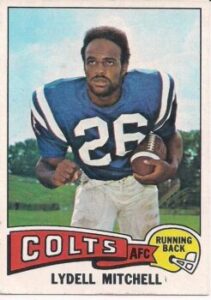
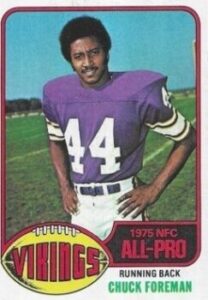
Larry Brown's Career
In his rookie season, Brown ran for 888 yards, the fourth-most in professional football. He finished second for the Rookie of the Year award behind Calvin Hill. He was also chosen for the Pro Bowl.
In 1970, Brown led the NFL in rushing with 1,125 yards. He was chosen for the Pro Bowl and All-Pro teams.
In 1971, he ran for 948 yards, ranking sixth in the league. He was again selected for the Pro Bowl and All-Pro teams.
1972 proved to be Brown’s best season. He ran for 1,216 yards, second best in the league, but he achieved this in only twelve games. He was the only running back in the league to average over 100 yards per game, and he also added another 473 yards receiving. He was again selected for the Pro Bowl and All-Pro teams and was awarded the NFL MVP.
But he wasn’t finished yet. In the playoff game against the Packers, he ran for 101 yards, and he was the Redskins’ primary offensive weapon in their 14–7 loss to the Dolphins in the Super Bowl, gaining 72 rushing yards and 26 yards receiving.
Brown ran for 860 yards in 1973, but his average per carry dropped to 3.2. Even with damaged knees, Brown caught 40 passes for 482 yards. He played for three more seasons, but injuries and bad knees caused him to retire after the 1976 season.
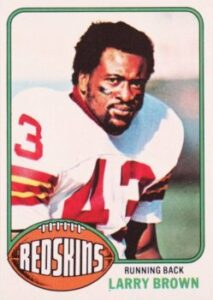
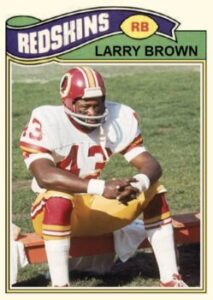
What Determines Hall of Fame Worthiness?
Why do some players get in while others with similar accomplishments don’t? It’s an age-old question, and I don’t know the answer.
In recent years, the Hall of Fame has become somewhat diluted, especially with the quick induction of modern players. Let them wait their turn, as most players of earlier eras had to.
Maybe we’ve focused too much on the Hall of Fame.
It’s not the only way to measure greatness. From 1969 to 1972, Larry Brown was among the top running backs in pro football. Whether he ever gets inducted into the Pro Football Hall of Fame or not is uncertain, but either way, football historians like me won’t forget him.
While I’m uncertain if his accomplishments in his eight-year career are enough to earn my vote (if I had one), I believe he deserves consideration, and I’ll be the first to say congratulations if he makes it.
Mark Morthier is the host of Yesterday’s Sports, a podcast dedicated to reliving memorable sports moments from his childhood days and beyond. He grew up in New Jersey just across from New York City, so many of his episodes revolve around the great sport’s teams of the 70s for the New York area.
He is also an author of No Nonsense, Old School Weight Training (Second Edition): A Guide for People with Limited Time and Running Wild: (Growing Up in the 1970s)

BOOKS BY MARK MORTHIER
Please Note – As an Amazon Associate I earn from qualifying purchases
More From Yesterday's Sports
1981 San Fransisco 49ers: First Super Bowl Victory
The San Francisco 49ers franchise began in 1946 in the...
Read MoreMonday Night Football Early Years (1985 – 1991)
Before we jump into Monday Night Football from 1985 thru...
Read MoreMonday Night Football Early Years (1979 – 1984)
Before we jump into Monday Night Football from 1979 thru...
Read MoreMonday Night Football Early Years (1974 – 1978)
Before we jump into Monday Night Football from 1974 thru...
Read More


